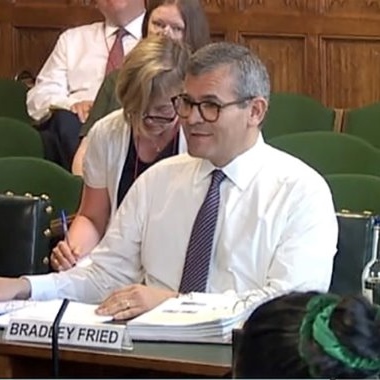News
A justifiable reason to turn down a Jewish Achiever nomination
Bradley Fried turned down his Absa Jewish Achiever Awards nomination this week. Not because he wasn’t totally honoured to be on the list, but because he has just been made Chair of Court of the Bank of England (BoE), the central bank’s oversight body.

JORDAN MOSHE
Describing his Achiever nomination as having been “completely out of the blue and so unduly generous”, Fried felt he had to decline the nomination.
Although he has only recently taken up the position, he is determined to make a positive contribution in line with the institution’s mandate. He explains: “Serving as the UK’s central bank since 1694, the BoE’s purpose is to ensure the good of the public of the UK by maintaining price and financial stability. What I hope to achieve is just that – namely, that through these globally very uncertain times, the BoE will retain its impact, trust and public confidence, and ensure sustained financial stability.”
And doing so means total dedication on Fried’s part, not brief trips back to South Africa for the Absa Jewish Achiever Awards, no matter how tempting it is.
Born and raised in Cape Town, Fried earned a bachelor’s degree in commerce with distinction from the University of Cape Town (UCT), a Master’s degree in business administration from the Wharton School of the University of Pennsylvania, and qualified as a chartered accountant after training with Arthur Andersen.
He has served as a partner at McKinsey & Company in New York, worked as the chief operating officer and chief executive at Investec UK, co-founded a private equity firm, and has served as a non-executive Director of the Court of the BoE since 2012. He has lived in New York and London, where he currently resides with his wife and children in St John’s Wood.
Fried reflected on his journey so far and paid tribute to those who have contributed to it. “The real ingredient throughout,” he says, “is to have always surrounded myself with people who could teach me a huge amount. That, without any doubt, has been the real catalyst for me.
“In my career, I guess I would say the most important moments are those coaching moments when I have been taught lessons by people who have literally helped me change the course of my behaviour, approach and life. That started early on with my late dad, the greatest possible role model, but along the way I’ve been given great (and sometimes difficult-to-hear) feedback by some incredibly caring colleagues.”
Fried remembers fondly the community of South Africa, and continues to visit his mom, Joan, and brother Greg and his family, who live in Cape Town. He says that while his journey has been fulfilling and exciting, he still misses his family and friends, as well as certain elements of home.
“I miss the overwhelming warmth of the South African Jewish community,” he says. “I have been part of a number of communities, but absolutely nothing can compare with the all-encompassing community spirit one feels in South Africa.
“South African Jews have a natural intuition for the notion of collective responsibility and very deeply understand what it means to care for the most vulnerable. It is actually quite extraordinary, and I feel remarkably privileged to have been raised in that community and to be a part of it, despite living in London.”
In his youth, Fried was an active member of the Habonim Dror youth movement in the community, an experience he remembers well. “Habonim was an incredibly special part of my life,” he says. “It was filled with experiences, friendships, independence and freedom – a remarkable social movement. I met my wife, Lauren, at Habonim. Lauren was from Harare and I was at my final Habonim Camp as a madrich, a first-year UCT student, so I would say that Habonim and its legacy is very much a continued part of my life!
“We took our sons to the campsite to celebrate 50 years of Habonim in Onrus. It was fantastic to see that much had stayed the same, but I did marvel at the hot water taps and proper toilets. It seems that kids are just possibly a bit more demanding than we were in the 1980s!”
Fried was sad not to accept the Achiever nomination. “I very much appreciate this nomination and found it very moving,” he says. “It brought back floods of wonderful memories of the South African Jewish community, which I will always regard as my core family, and of which I feel an integral part.”
As he explains: “Getting the role [at BoE] is not the real achievement. Rather, performing it with distinction over time to come will be the achievement, possibly one day worth another Jewish Achiever nomination. I have some serious work ahead of me in a global environment that is filled with challenges. The first step is to navigate those.”